Related Research Articles
Ward–Belmont College was a women's college, also known at the time as a "ladies' seminary," located in Nashville, Tennessee, on the grounds of the antebellum estate of Adelicia Hayes Franklin Acklen Cheatham.
Ulrich Bonnell Phillips was an American historian who largely defined the field of the social and economic studies of the history of the Antebellum South and slavery in the U.S. Phillips concentrated on the large plantations that dominated the Southern economy, and he did not investigate the numerous small farmers who held few slaves. He concluded that plantation slavery produced great wealth, but was a dead end, economically, that left the South bypassed by the industrial revolution underway in the North.
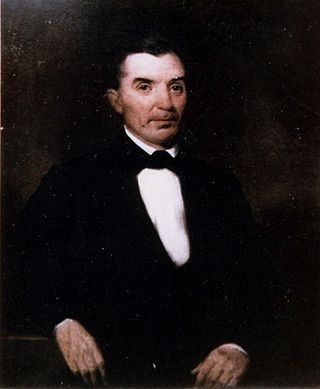
Isaac Franklin was an American slave trader and plantation owner. He was the co-founder of Franklin & Armfield, which became the largest slave trading firm in the United States. Based in Alexandria, Virginia, it also had offices in New Orleans and other Louisiana cities. Franklin owned six plantations in Louisiana and Tennessee. His Fairvue plantation, in Sumner County, Tennessee, was formerly listed on the National Register of Historic Places.

Convict leasing was a system of forced penal labor that was practiced historically in the Southern United States, the laborers being mainly African-American men; it was ended during the 20th century. It provided prisoner labor to private parties, such as plantation owners and corporations.
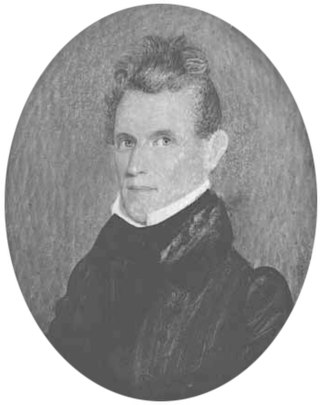
George Washington Barrow was a slave owner, American politician, a member of the United States House of Representatives for Tennessee's 8th congressional district; he later fought against the Union as a member of the Confederate Army and was charged with treason.
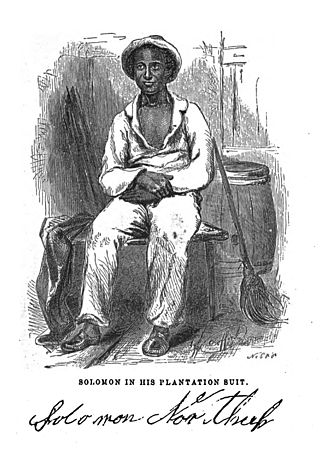
Twelve Years a Slave is an 1853 memoir and slave narrative by Solomon Northup as told to and written by David Wilson. Northup, a black man who was born free in New York state, details himself being tricked to go to Washington, D.C., where he was kidnapped and sold into slavery in the Deep South. He was in bondage for 12 years in Louisiana before he was able to secretly get information to friends and family in New York, who in turn secured his release with the aid of the state. Northup's account provides extensive details on the slave markets in Washington, D.C., and New Orleans, and describes at length cotton and sugar cultivation and slave treatment on major plantations in Louisiana.
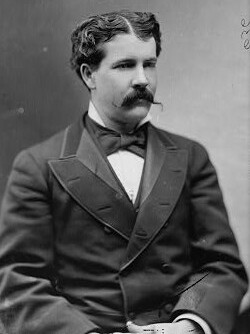
Joseph Hayes Acklen was an American politician who served as a U.S. Representative from Louisiana from 1878 to 1881.
Joseph Acklen may refer to:

Belmont Mansion, also known as Acklen Hall, and originally known as Belle Monte, Belle Mont or Belmont, is a historic mansion located in Nashville, Tennessee. It was built by Joseph and Adelicia Acklen to serve as the center of their 180-acre summer estate in what was then country outside the city, and featured elaborate gardens and a zoo. They lived much of the rest of the year on her plantations in Louisiana.
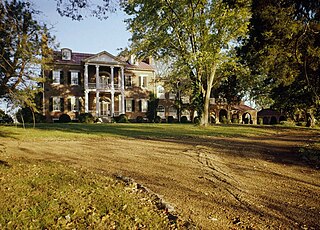
Isaac Franklin Plantation, also known as Fairvue, is an antebellum plantation house in Gallatin, Tennessee.

The African slave trade was first brought to Alabama when the region was part of the French Louisiana Colony.

Adelicia Hayes Franklin Acklen Cheatham, best known as Adelicia Acklen, became the wealthiest woman in Tennessee and a plantation owner in her own right after the 1846 death of her first husband, Isaac Franklin. As a successful slave trader, he had used his wealth to purchase numerous plantations, lands, and slaves in Tennessee and Louisiana. Acklen later in 1880 sold four contiguous plantations in Louisiana as one property. These have formed the grounds of the Louisiana State Penitentiary since 1901.

Plantation complexes were common on agricultural plantations in the Southern United States from the 17th into the 20th century. The complex included everything from the main residence down to the pens for livestock. Until the abolition of slavery, such plantations were generally self-sufficient settlements that relied on the forced labor of enslaved people.

Edmund Richardson was an American entrepreneur who acquired great wealth during the mid-19th century by producing and marketing cotton in the states of Mississippi, Louisiana, and Arkansas. At the time of his death, he was described as the richest man in the South.
Edward Saunders Cheatham was an American politician and businessman.
Boyd M. Cheatham was an American politician from Springfield, Tennessee. He came from a very political family, following his father and uncle into electoral office. He served in the Tennessee State House.

William Hayes Ackland was an American lawyer, writer, and art collector from Nashville, Tennessee. He lived most of his life away from Tennessee, in Washington, DC, and various social spots, traveling to England annually for its social season. The Ackland Art Museum at the University of North Carolina Chapel Hill was begun with his collection.
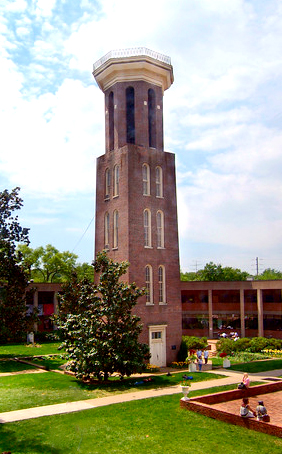
The Belmont Tower and Carillon is an iconic structure on the campus of Belmont University in Nashville, Tennessee. The Tower is listed in the National Register of Historic Places as part of the Belmont Mansion registration and is prominently featured in the university logo. The current Belmont University Tower and Carillon chimes each hour from 9:00am–8:00pm.
Acklen is a surname. Notable people with the surname include:
References
- 1 2 3 Find a Grave - Joseph Alexander Smith Acklen
- 1 2 3 4 5 6 7 "Belmont Mansion - People". Archived from the original on 2018-11-27. Retrieved 2018-11-26.
- ↑ Huntsville History Collection - Joseph Alexander Smith Acklen
- ↑ A Register of the Officers and Students of the University of Alabama, 1831-1901, p. 41
- ↑ Belmont Mansion - History
- ↑ Excerpts from "Advice, orders and instructions for the management, government and guidance of the general agent, overseers and employees on the plantations of Joseph A.S. Acklen" quoted from "Ought Slavery Be Perpetuated," by William Gannaway Brownlow and Abram Pryne, pp. 95-96